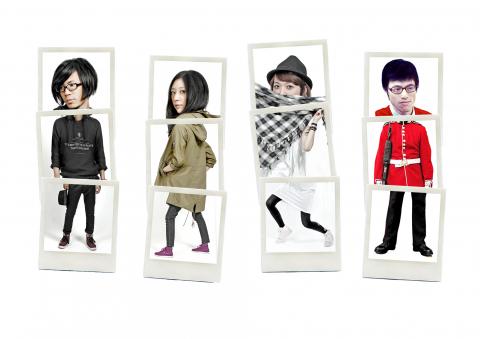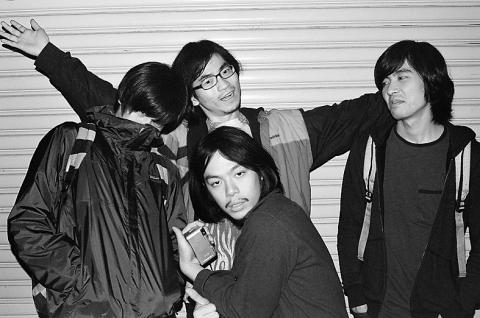Indie rock fans in Kaohsiung are being offered variety tonight, with live music from one band that wields pop rock noise on electric guitars and another that pumps out beats on laptop computers.
Both aim to have the audience dancing. Touming Magazine (透明雜誌) and Unfamiliar Friends Party (不熟的朋友派對), both based in Taipei, are performing at the Pier 2 Art District (高雄駁二藝術特區) to promote newly released CDs.
Touming Magazine’s guitar-heavy sound and tightly arranged songs clearly nod to their musical heroes, mostly American alternative rock bands from the late 1980s and early 1990s like the Pixies, Weezer and Superchunk.

Photo Courtesy of Unfamiliar Friends Party and Touming Magazine
Twenty-eight-year-old Hung Shen-hao (洪申豪), who is the frontman of the four-piece group and mostly sings in Mandarin, says he feels “young people” don’t share the same musical tastes as the band, but that doesn’t bother him. “We just play the music we like,” he told the Taipei Times.
Touming Magazine recently released a full-length debut album titled Soul Music (我們的靈魂樂), and its pep and solid repertoire ought to have concertgoers moving to the music.
The evening starts with a set of electronica rock from Unfamiliar Friends Party. Tonight’s show is being billed as the band’s official release party in Kaohsiung for its new six-song EP titled Headstrong (頭好壯壯).

Photo Courtesy of Unfamiliar Friends Party and Touming Magazine
Unfamiliar Friends, a four-piece group (currently a trio with one member studying abroad), performs all of its music on Macbooks, MIDI controllers and electronic keyboards.
The group’s beats favor new wave rock grooves, and the music is full of spacey atmosphere with melodies built on video game-like sounds.
“All the people that hear our music say it’s joyful,” band member Lily Chen (陳郁欣) said.

April 28 to May 4 During the Japanese colonial era, a city’s “first” high school typically served Japanese students, while Taiwanese attended the “second” high school. Only in Taichung was this reversed. That’s because when Taichung First High School opened its doors on May 1, 1915 to serve Taiwanese students who were previously barred from secondary education, it was the only high school in town. Former principal Hideo Azukisawa threatened to quit when the government in 1922 attempted to transfer the “first” designation to a new local high school for Japanese students, leading to this unusual situation. Prior to the Taichung First

When the South Vietnamese capital of Saigon fell to the North Vietnamese forces 50 years ago this week, it prompted a mass exodus of some 2 million people — hundreds of thousands fleeing perilously on small boats across open water to escape the communist regime. Many ultimately settled in Southern California’s Orange County in an area now known as “Little Saigon,” not far from Marine Corps Base Camp Pendleton, where the first refugees were airlifted upon reaching the US. The diaspora now also has significant populations in Virginia, Texas and Washington state, as well as in countries including France and Australia.

On April 17, Chinese Nationalist Party (KMT) Chairman Eric Chu (朱立倫) launched a bold campaign to revive and revitalize the KMT base by calling for an impromptu rally at the Taipei prosecutor’s offices to protest recent arrests of KMT recall campaigners over allegations of forgery and fraud involving signatures of dead voters. The protest had no time to apply for permits and was illegal, but that played into the sense of opposition grievance at alleged weaponization of the judiciary by the Democratic Progressive Party (DPP) to “annihilate” the opposition parties. Blamed for faltering recall campaigns and faced with a KMT chair

Article 2 of the Additional Articles of the Constitution of the Republic of China (中華民國憲法增修條文) stipulates that upon a vote of no confidence in the premier, the president can dissolve the legislature within 10 days. If the legislature is dissolved, a new legislative election must be held within 60 days, and the legislators’ terms will then be reckoned from that election. Two weeks ago Taipei Mayor Chiang Wan-an (蔣萬安) of the Chinese Nationalist Party (KMT) proposed that the legislature hold a vote of no confidence in the premier and dare the president to dissolve the legislature. The legislature is currently controlled